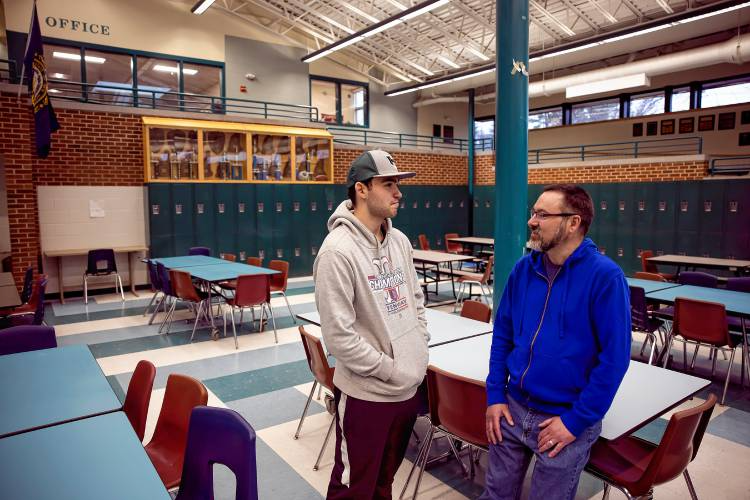Alan Moskin, a World War II (WWII) veteran who participated in the liberation of the Gunskirchen Concentration Camp in Mauthausen, Austria, came to UNH to deliver a lecture in the Memorial Union Building (MUB) on Wednesday night. Part of the MUB Lecture Series, the talk was sponsored by the Interfraternity Council, Hillel, Amnesty International and UNH STAND.
Moskin, who served as a U.S. infantry soldier, was born in Englewood, New Jersey on May 30, 1926. He attended Syracuse University both before and after his military service in WWII. At age 18, Moskin was drafted into the U.S. Army during WWII and served from September 1944 to August 1946. His outfit fought in combat through France, Germany and Austria, during which he was promoted in rank from private to staff sergeant.
A full house gathered to hear what Moskin had to say about his experiences in WWII. A palpable silence accompanied every break in his speech.

Moskin painted the situation to the audience. The year was 1945; World War II was coming to an end. The Nazi regime had crumbled and victory was within the Allies’ reach. Yet, the true horrors of Hitler’s Germany were just beginning to be discovered. Moskin, a member of the 66th Infantry, 71st Division led by General George Patton, came across an atrocity in the form of the Gunskirchen Concentration Camp. Very little resistance met his company as they cut through the barbwire into the camp.
“What I saw was the most horrific sights I’ve ever seen and hope to see for the rest of my life,” Moskin said. “Upon entering, on the left was a pile of skeletal like bodies, and on the right was another pile.”
He recalls the disparity of the prisoners, how they groveled and prayed at his feet. Walking among piles of bodies, it was hard to tell who was living and who was dead. A prisoner approached and embraced him; this was the moment where Moskin broke down into tears.
“Those poor souls were so misshapen it defies description; their eyes were sunken into their sockets, open, lice-infested sores covered their skin, the stench coming off their bodies was unimaginable,” he said. “I try to forget but I can’t, I try but it has been tattooed onto my heart.”
Moskin’s descriptions of his experience liberating the concentration camp dug deep. The horrors he witnessed were obviously not to be taken lightly. What really hit home was Moskin paying tribute to his brothers in arms, the ones who didn’t make it home. He mentioned his 71st division tribute cap and how it is a token to their camaraderie.
“I wear it because it makes me feel connected to a lot of my buddies who were less fortunate than me,” he said. “I speak here today for all my buddies who didn’t make it home, I’m their messenger.”
Some attendees of Moskin’s lecture felt a special connection to his experience.
“Mr. Moskin’s visit was an opportunity that is dwindling as the years go by. Both my grandfathers served in WWII so I could get a sense of the horrific scenes he described,” junior communication major Justin Rogers said. “He comes from a time that we seem to be forgetting and his story of his service was a very humbling snapshot of one of the most important events of the past.”
Follow Us on Twitter
A WWII vet, a personal account and a dwindling opportunity to tell it
October 6, 2016
Leave a Comment
More to Discover




















